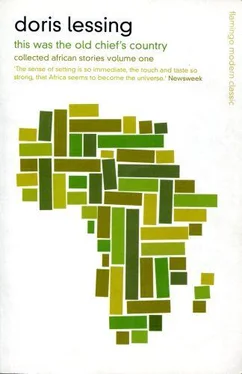They were good, the years of ranging the bush over her father's farm which, like every white farm, was largely unused, broken only occasionally by small patches of cultivation. In between, nothing but trees, the long sparse grass, thorn and cactus and gully, grass and outcrop and thorn. And a jutting piece of rock which had been thrust up from the warm soil of Africa unimaginable eras of time ago, washed into hollows and whorls by sun and wind that had travelled so many thousands of miles of space and bush, would hold the weight of a small girl whose eyes were sightless for anything but a pale willowed river, a pale gleaming castle — a small girl singing: 'Out flew the web and floated wide, the mirror cracked from side to side
Pushing her way through the green aisles of the mealie stalks, the leaves arching like cathedrals veined with sunlight far overhead, with the packed red earth underfoot, a fine lace of red-starred witchweed would summon up a black bent figure croaking premonitions: the Northern witch, bred of cold Northern forests, would stand before her among the mealie fields, and it was the mealie fields that faded and fled, leaving her among the gnarled roots of an oak, snow falling thick and soft and white, the woodcutter's fire glowing red welcome through crowding tree trunks.
A white child, opening its eyes curiously on a sun-suffused landscape, a gaunt and violent landscape, might be supposed to accept it as her own, to take the msasa trees and the thorn trees as familiars, to feel her blood running free and responsive to the swing of the seasons.
This child could not see a msasa tree, or the thorn, for what they were. Her books held tales of alien fairies, her rivers ran slow and peaceful, and she knew the shape of the leaves of an ash or an oak, the names of the little creatures that lived in English streams, when the words 'the veld' meant strangeness, though she could remember nothing else.
Because of this, for many years, it was the veld that seemed unreal; the sun was a foreign sun, and the wind spoke a strange language.
The black people on the farm were as remote as the trees and the rocks. They were an amorphous black mass, mingling and thinning and massing like tadpoles, faceless, who existed merely to serve, to say 'Yes, Baas,' take their money and go. They changed season by season, moving from one farm to the next, according to their outlandish needs, which one did not have to understand, coming from perhaps hundreds of miles North or East, passing on after a few months — where? Perhaps even as far away as the fabled gold mines of Johannesburg, where the pay was so much better than the few shillings a month and the double handful of mealie meal twice a day which they earned in that part of Africa.
The child was taught to take them for granted: the servants in the house would come running a hundred yards to pick up a book if she dropped it. She was called 'Nkosikaas' — Chief- tainess, even by the black children her own age.
Later, when the farm grew too small to hold her curiosity, she carried a gun in the crook of her arm and wandered miles a day, from vlei to vlei, from kopje to kopje, accompanied by two dogs: the dogs and the gun were an armour against fear. Because of them she never felt fear.
If a native came into sight along the kaffir paths half a mile away, the dogs would flush him up a tree as if he were a bird. If he expostulated (in his uncouth language which was by itself ridiculous) that was cheek. If one was in a good mood, it could be a matter for laughing. Otherwise one passed on, hardly glancing at the angry man in the tree.
On the rare occasions when white children met together they could amuse themselves by hailing a passing native in order to make a buffoon of him; they could set the dogs on him and watch him run; they could tease a small black child as if he were a puppy — save that they would not throw stones and sticks at a dog without a sense of guilt.
Later still, certain questions presented themselves in the child's mind; and because the answers were not easy to accept, they were silenced by an even greater arrogance of manner.
It was even impossible to think of the black people who worked about the house as friends, for if she talked to one of them, her mother would come running anxiously: 'Come away; you mustn't talk to natives.'
It was this instilled consciousness of danger, of something unpleasant, that made it easy to laugh out loud, crudely, if a servant made a mistake in his English or if he failed to understand an order — there is a certain kind of laughter that is fear, afraid of itself.
One evening, when I was about fourteen, I was walking down the side of a mealie field that had been newly ploughed, so that the great red clods showed fresh and tumbling to the vlei beyond, like a choppy red sea; it was that hushed and listening hour, when the birds send long sad calls from tree to tree, and all the colours of earth and sky and leaf are deep and golden. I had my rifle in the curve of my arm, and the dogs were at my heels.
In front of me, perhaps a couple of hundred yards away, a group of three Africans came into sight around the side of a big antheap. I whistled the dogs close in to my skirts and let the gun swing in my hand, and advanced, waiting for them to move aside, off the path, in respect for my passing. But they came on steadily, and the dogs looked up at me for the command to chase. I was angry. It was 'cheek' for a native not to stand off a path, the moment he caught sight of you.
In front walked an old man, stooping his weight on to a stick, his hair grizzled white, a dark red blanket slung over his shoulders like a cloak. Behind him came two young men, carrying bundles of pots, assegais, hatchets.
The group was not a usual one. They were not natives seeking work. These had an air of dignity, of quietly following their own purpose. It was the dignity that checked my tongue. I walked quietly on, talking softly to the growling dogs, till I was ten paces away. Then the old man stopped, drawing his blanket close.
'’Morning, Nkosikaas,' he said, using the customary greeting for any time of the day.
'Good morning,' I said. 'Where are you going?' My voice was a little truculent.
The old man spoke in his own language, then one of the young men stepped forward politely and said in careful English: 'My Chief travels to see his brothers beyond the river.'
A Chief! I thought, understanding the pride that made the old man stand before me like an equal — more than an equal, for he showed courtesy, and I showed none.
The old man spoke again, wearing dignity like an inherited garment, still standing ten paces off, flanked by his entourage, not looking at me (that would have been rude) but directing his eyes somewhere over my head at the trees.
'You are the little Nkosikaas from the farm of Baas Jordan?'
'That's right,' I said.
'Perhaps your father does not remember,' said the interpreter for the old man, 'but there was an affair with some goats. I remember seeing you when you were…' The young man held his hand at knee level and smiled.
We all smiled.
'What is your name?' I asked.
'This is Chief Mshlanga,' said the young man.
'I will tell my father that I met you,' I said.
The old man said: 'My greetings to your father, little Nkosikaas.'
'Good morning,' I said politely, finding the politeness difficult, from lack of use.
'’Morning, little Nkosikaas,' said the old man, and stood aside to let me pass.
I went by, my gun hanging awkwardly, the dogs sniffing and growling, cheated of their favourite game of chasing natives like animals.
Not long afterwards I read in an old explorer's book the phrase: 'Chief Mshlanga's country'. It went like this: 'Our destination was Chief Mshlanga's country, to the north of the river; and it was our desire to ask his permission to prospect for gold in his territory.'
Читать дальше
Конец ознакомительного отрывка
Купить книгу












